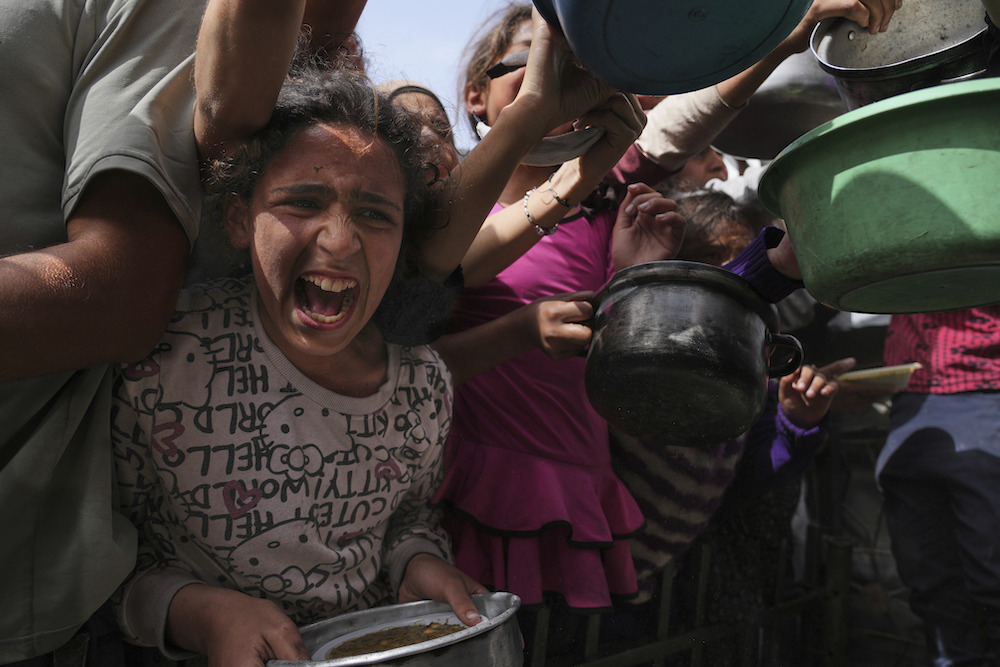NEW YORK CITY: Basel Adra, the Palestinian co-director of the Oscar-winning documentary film “No Other Land,” has garnered global attention for his compelling portrayal of the hardships faced by Palestinians in the West Bank, particularly his home region of Masafer Yatta.
The film chronicles the ongoing violence against, and forced displacement of, Palestinians at the hands of Israeli forces and settlers in an area designated a restricted military zone by Israel since the 1980s.
Despite all the accolades for the film over the past year, including the Oscar for Best Documentary Feature at the Academy Awards last month, Adra’s message remains one of urgency and resistance.
The filmmaker spoke with Arab News in New York about the continuing suffering of the Palestinian people, and underscored the fact that the situation has worsened despite the international recognition of his work.
“No Other Land” has sparked intense emotional responses from audiences worldwide but Adra believes the film should do more than just evoke feelings of sadness, it should inspire action.
“Audiences feel emotionally connected to the people of Masafer Yatta, to the land and to the cause,” he said. “But it’s not enough to just feel sorrow for them. People need to use their voices to influence their governments and to hold Israel accountable for violating international law.”
Adra, who had been invited to New York speak at the UN by the Committee on the Inalienable Rights of the Palestinian People, continues to call for international pressure on Israel to end its occupation of Palestinian territory.
During his speech, which followed a screening of his film that received a lengthy standing ovation from a full house, Adra made an impassioned plea: “I wanted the world to know that we live in this land, that we exist, and to see what we face on a daily basis — this brutal occupation.”
His film reveals the harsh realities of Palestinians who face violent evictions, the demolition of their homes and attacks by Israeli settlers, all under the protection of the Israeli military.
After a prolonged legal battle over the expulsion of residents from eight villages in Masafer Yatta, in 2022 the Israeli Supreme Court ruled in favor of the Israeli army and allowed the evictions to proceed.
Adra said that the recognition of the film by the Academy Awards, though a moment of pride, has not resulted in any tangible changes on the ground for Palestinians.
“Even after winning the Oscar, we went back to the same reality,” he lamented. In fact the situation has only gotten worse. While attacks by Israeli settlers in the West Bank had long been escalating, the situation has reached new heights of violence since the start of the war between Israel and Hamas in Gaza.
Last week, one of Adra’s co-directors, fellow Palestinian Hamdan Ballal, reported he had been attacked by Israeli settlers for winning the Oscar, and was detained by Israeli police for “hurling rocks,” during which he suffered a beating and “brutality.”
In a somber reflection, Adra acknowledged the growing risks to Palestinian communities in Masafer Yatta and reiterated the urgent need for the world to act.
“There’s no time to wait,” he said. “The international community needs to take serious action now. Otherwise, Israel will continue with its aggression.”
Though widely acclaimed, the documentary has sparked mixed reactions from some, particularly regarding the involvement of Yuval Abraham, one of two Israeli co-directors of the film (the other is Rachel Szor), a figure some critics felt represented a form of “normalization” of Israeli policies.
Adra firmly rejected this suggestion and said such criticism makes him “very sad,” adding: “The last thing I want is to normalize the occupation. Everything I do with Yuval is activism, to change this and to end the occupation.”
Despite the challenges, Adra said his bond with his co-director remains strong.
“Now, we are allies and we are activists. We will continue to fight,” he added, affirming their shared mission to end the occupation and the system of apartheid Israel operates in the Palestinian territories.
Looking ahead, Adra said his work continues to be driven by the hope of a better future for his people. He plans to return to Palestine soon, and his message to the Palestinian people remains consistent: “To keep standing strong, not to give up, and to hold on. We have to keep being alive.”
Despite the critical acclaim, Oscar recognition and other awards it has received, “No Other Land” has has found it difficult to secure widespread distribution, particularly in the US.
In a world where the cost of inaction is high, Adra said he will continue to work tirelessly for justice in an attempt to compel audiences and governments around the world to reflect on their role in the ongoing conflict and take responsibility for the lives that are affected.





























